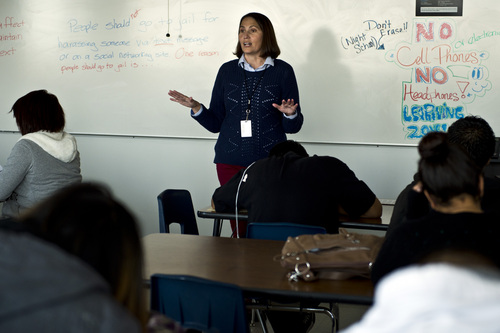This is an archived article that was published on sltrib.com in 2013, and information in the article may be outdated. It is provided only for personal research purposes and may not be reprinted.
In case we needed any, the way Utah's alternative high schools were graded by the Legislature in September is clear evidence that the new statewide grading system is deficient, not only in its methods but also its motives.
If, as they say, legislative leaders were trying only to help "shine a bright light" on schools that are not meeting the academic needs of students, why on earth did they fail to adjust their grading criteria to be fair to schools that exist to keep failing students from dropping out?
Alternative schools were created to help those kids catch up on credits so they can graduate. If they're too far behind, the schools help them earn general education diplomas or adult education diplomas. Experienced and skilled educators can also help them enroll in a trade school or college.
These schools help fill the gaps that separate struggling students from those who manage to navigate the public schools successfully. They should not be held to the same standard as traditional high schools.
Half of Utah's 18 alternative high schools received F's, two more had D's and two had C's. Five of the schools didn't receive grades because too few of their students took the tests that are the primary indicators of progress.
Republican legislators' penchant for micromanaging education was in overdrive when they came up with this redundant letter-grade system. The State Office of Education has also adopted school grading. Sadly, the state office's system also failed alternative high schools.
We support efforts to hold schools and administrators accountable, but the system has to be fair. And "shining a bright light" should be only the first step to improving children's chances for academic success. Once a school is identified as needing to improve, the district or state office should direct reforms, supported and funded by the Legislature. But that vital next step is missing in this system.
Senate President Wayne Neiderhauser's comment, "Schools don't pick their students, but they decide how well a student does in school" is another indicator of legislators' ignorance about the challenges facing educators. Failing to differentiate the role of alternative high schools from that of traditional high schools is more clear evidence they don't know enough about how Utah's education system works.
It's no surprise there is talk about revising the grading system — "sanding the rough edges," as Neiderhauser puts it.
A better solution? Repeal the flawed system. Meaningless letter grades reflecting only test scores that don't take into account the complexities of educating children from all cultural backgrounds and family situations are not helpful.



